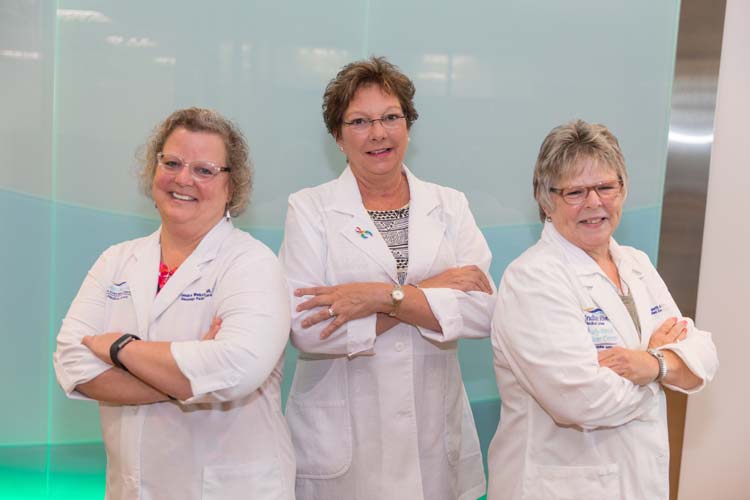
If you are curious, you could go to the National Institutes of Health’s website and look up the definition of a “cancer navigator,” but if you want an even clearer picture, just spend some time with Sandy Webster, Denise Hudspeth and Joanna Brown, patient navigators at Scully Welsh Cancer Center in Vero Beach.
Eventually that trio would probably get around to offering an official-sounding definition of their job. They might say something like “they help patients and family members navigate an ongoing maze of doctors appointments, treatment schedules, clinics, outpatient centers, insurance forms, payment systems, psychological hurdles and transportation issues.”
In the meantime, however, Hudspeth describes their task much more simply.
“We’re the GPS of cancer,” she says smiling.
A global positioning system for cancer patients is probably every bit as accurate as any fancier description. Webster, Hudspeth and Brown can tell their patients exactly how to get where they need to go in order to get where they want to be: cancer-free.
Webster chimes in almost instantly to talk about one of the newer and most popular additions to Scully-Welsh. Its Dignicap machine.
“It was a donation from our community. Answers for Cancers – the Grand Harbor folks – who are wonderful. Initially, it was FDA-approved only for females undergoing breast cancer treatment,” Webster explains, “but now it’s been opened up to more than just breast cancer patients.”
The Cliffs Notes description of the Dignicap is that it helps many patients undergoing chemotherapy avoid losing their hair.
Narrowing or constricting the blood vessels in the scalp by cooling them, the Dignicap reduces the volume of chemotherapy drugs that are able to reach the hair follicles or roots.
If the follicles stay healthy, the hair stays put.
The Journal of the American Medical Association says 66.3 percent of patients in a multi-center study were able to avoid total hair loss with the use of Dignicaps.
To Webster’s way of thinking, that allows women to “keep their cancer private if they so wish.”
The device has proved so popular that a second machine has now been ordered and, as Webster says, its use is no longer restricted only to breast cancer patients.
Webster then changes gears by pointing out that “lung cancer is the number one killer in Indian River County” and to combat that, she says, “we’re trying to initiate lung cancer screenings – which are being done at Vero Radiology – with low-dose CAT scans. Our goal is to pick up lung cancer at its earliest stage where – with surgery alone – it can be cured.”
Low dose CT scans not only use lower levels of radiation, adds Hudspeth, they also provide better imaging: “Low-dose CT scans,” say says, “can pick up anything as small as a rice grain.”
“When [lung] cancer advances,” Webster points out, patients “may have to have chemo, radiation and possibly surgery as well.”
“We are a full-service cancer center here,” Webster adds. “We have a support groups for prostate, breast and other cancer patients as well as ones for caregivers.”
“If somebody has a cancer diagnosis,” she continues, “they can come into this building for everything from medical oncology to radiation oncology, chemotherapy, to see a navigator, to get spiritual counseling or mental health counseling or nutritional support. We’re just continuing to offer all that we can to support that patient going through that cancer journey. It really is a privilege to be able to say that we can offer that to them.”
While it may be a privilege, it’s also a lot of work. Hudspeth, Webster and Brown are currently “navigating” for some 300 patients in various stages of cancer care or treatment. A fourth will likely soon be hired, which should ease the workload at least a little.
That’s a good thing. The American Cancer Society reports that, “In a study published in the Journal of Clinical Oncology, patients with nurse navigators rated their care higher and reported fewer problems than patients without one.”
It’s equally clear that Hudspeth and Webster (and the decidedly less loquacious Brown) are determined to see to it that their patients get the best care they can deliver.
The Scully-Welsh Cancer Center is located at 3555 10th Court in Vero Beach, just behind the Indian River Medical Center. The direct line to the center’s navigators is 772-226-4827.



